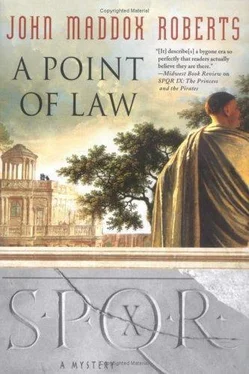John Roberts - A Point of Law
Здесь есть возможность читать онлайн «John Roberts - A Point of Law» весь текст электронной книги совершенно бесплатно (целиком полную версию без сокращений). В некоторых случаях можно слушать аудио, скачать через торрент в формате fb2 и присутствует краткое содержание. Год выпуска: 0101, ISBN: 0101, Издательство: St. Martin, Жанр: Исторический детектив, на английском языке. Описание произведения, (предисловие) а так же отзывы посетителей доступны на портале библиотеки ЛибКат.
- Название:A Point of Law
- Автор:
- Издательство:St. Martin
- Жанр:
- Год:0101
- ISBN:9780312337254
- Рейтинг книги:5 / 5. Голосов: 1
-
Избранное:Добавить в избранное
- Отзывы:
-
Ваша оценка:
- 100
- 1
- 2
- 3
- 4
- 5
A Point of Law: краткое содержание, описание и аннотация
Предлагаем к чтению аннотацию, описание, краткое содержание или предисловие (зависит от того, что написал сам автор книги «A Point of Law»). Если вы не нашли необходимую информацию о книге — напишите в комментариях, мы постараемся отыскать её.
A Point of Law — читать онлайн бесплатно полную книгу (весь текст) целиком
Ниже представлен текст книги, разбитый по страницам. Система сохранения места последней прочитанной страницы, позволяет с удобством читать онлайн бесплатно книгу «A Point of Law», без необходимости каждый раз заново искать на чём Вы остановились. Поставьте закладку, и сможете в любой момент перейти на страницу, на которой закончили чтение.
Интервал:
Закладка:
“Exactly,” I affirmed. “Marcus Fulvius’s brother-in-law was the most popular tribune of his generation. His grandfather was the glorious hero of the plebs. His great grandmother was the most revered woman in Roman history. His great-great grandfather was the man who defeated Hannibal, then was cheated of all his honors by Cato the Censor, the most reactionary aristocrat who ever lived.”
I sat back and took a long drink. I needed one. “Picture it: There I am, standing for trial in the court of Juventius. The jury are all members of the equestrian order. Very few members of that body who are not our clients are very friendly toward us in the first place. Marcus Fulvius gets up to introduce himself and reels off that list of recent ancestors and family connections. What happens next?” I looked at them, from one to the other in turn. Father spoke first.
“He steps right into the spot vacated by Clodius.”
“And,” said Nepos, “he demands to be elected tribune, even though he hasn’t served a quaestorship. It’s been done before.”
Father’s scarred face flamed. “This has been going on and we didn’t know about it?”
“Why should we?” I asked him. “There’s a revolution in the making, and it’s directed against people like us.”
“Against the Roman Constitution, you mean,” Scipio said.
“No, against a few entrenched families that have wielded power for far too long. Who has held power in Rome these thirty years past? Men like Pompey and Crassus, Hortensius Hortalus, Lucullus, families like the Claudia Marcella, and, yes, the Caecilia Metella. All of them supporters of Sulla. The old dictator killed all his enemies and theirs, and left them the Republic to run as they saw fit under his new constitution.
“People are growing tired of them-tired of us , I should say. Caesar gained power with the populares by identifying himself with his uncle-by-marriage, Marius, the sworn enemy of Sulla. Should it be any surprise that another man would try to do the same by stressing his descent from the Gracchi and Africanus?”
Father surprised me by, for once, not berating me for having such disloyal thoughts. He brooded for a while, then said, “I believe my son is right in this. By whatever pseudo-Greek process of logic, he has found the basis of this threat. But we still don’t know who killed this Marcus Fulvius or why. We had the most reason to, and we know we didn’t do it.” He glared at the others. “We didn’t do it, did we?”
Nepos and Scipio vigorously denied any involvement. “Face it,” Nepos said, “none of us was clever enough even to have seen the threat. We had no reason to kill him until Decius here just explained it, and now he is already dead. But where does Caius Claudius Marcellus fit into this? As you just said, Decius, the Claudia Marcella are old Sullans and they’re rabidly against Caesar. Why give patronage to this putative Man of the People?”
“Perhaps,” Scipio said, “the Marcelli wanted to raise up a rival to Caesar. Fulvius might have drained off some of the popular support Caesar needs to further his ambitions. Clodius was Caesar’s tame dog. Fulvius would not have been.”
“Very astute,” I admitted. “That may very well have been a part of it. It still doesn’t explain who killed him.”
We pondered that for a while, until we decided that we weren’t going to come to any conclusions that night.
At the door Father turned to me and said, “Only you could use an investigation as an excuse for a wine-tasting expedition, and then make it work.” I could almost have sworn that I saw him smile.
Julia came to join me as soon as they were gone.
“I suppose you were listening,” I said.
“Naturally. Things are beginning to make a sort of sense. Maybe we can get the rest before it’s trial time.”
“We’re running short of sources to investigate,” I complained.
“They’re all around us.”
“What do you mean?”
“How tired are you? Are you up to another expedition tonight?”
“Where are we going?” Ordinarily, Julia was vehemently opposed to all nocturnal wanderings. Rome was a dangerous city, and my reputation was well-earned.
“Not far. The neighbors will be up all night, the wine is flowing freely, and this is the Subura. What better time and place to pick up City gossip?”
Tired though I was, this prospect lent me new energy. “Splendid idea! You get your girl, I’ll find Hermes, and we’ll go test the waters.”
I dashed to my study, bellowing for Hermes. He joined me and I opened the box on my desk, took out my caestus and dagger, and tucked them within my tunic. No sense taking any chances. Hermes helped me don the dingy old toga I wore for nocturnal excursions, and I was ready to go.
Julia waited at the door, her head now decently covered by her palla and accompanied by Cypria, her maid. We went out into the bustling streets of the Subura.
The festive air was not as extreme as at one of the great celebrations like Saturnalia or Floralia. On those occasions, nobody would be sober and upright at this late hour. The atmosphere was more that of a country village fair, with a great deal of jollity but without the total license of the state-sanctioned orgies.
We received the usual greetings from our neighbors, and we welcomed and praised the soldiers from the district who were visiting their homes, some of them for the first time in years. There were depressingly few of these though. Young City men rarely served in the legions anymore. The legions depended more and more on the Italian municipia , the rural citizen communities where life was dull enough to make a soldier’s life seem attractive. There was just too much to do in Rome. Life was easy and exciting in the great City. I couldn’t blame them. I, too, hated to leave Rome.
The district’s innumerable men’s clubs and funeral societies stood open, illuminated with candles and lamps. On every corner fragrant smoke rose from charcoal braziers, where vendors served warmed wine and grilled sausages. There were no major temples in the Subura, but many small ones. Fires had been kindled before the altars of these so that the gods of the district could share in the festivities.
Our first stop of the evening was an inn called the Gorgon. It was run by a man named Strabo and his freedwoman wife, Lucia. It had stables where I occasionally boarded horses, and on this night the courtyard framed by the stables and the main building had been filled with tables to accommodate the crowd.
We found places at a table crowded by neighbors and were greeted noisily. Strabo and Lucia bustled over personally to fill our cups.
“Welcome, Senator, my lady!” Strabo cried. “This is even better than the usual election season, isn’t it?”
“For us, anyway,” Lucia chimed in. “Too bad about this Fulvius business.” She didn’t seem greatly saddened by my predicament. Not with the business her inn was doing that night.
“Pay it no heed,” Strabo advised me. “It will all blow over in a few days.”
“In a few days the elections will be over, and I can’t get elected with this hanging over me.”
“Hadn’t thought of that,” he admitted.
“It’s all the Via Sacrans’s doing,” Lucia asserted. “Ever since they lost Clodius, they’ve been looking to do us a bad turn. They know you’re our favorite senator.”
The Via Sacrans and the Suburans, though fellow Romans, regard each other the way the Spartans and Athenians used to. The rivalry was usually good-natured: shouting at each other in the Circus, where the Suburans supported the Greens and the Via Sacrans the Blues, and the annual fight over the head of the October Horse. But sometimes it erupted into a minor civil war, with scores killed in days of running street fights.
Читать дальшеИнтервал:
Закладка:
Похожие книги на «A Point of Law»
Представляем Вашему вниманию похожие книги на «A Point of Law» списком для выбора. Мы отобрали схожую по названию и смыслу литературу в надежде предоставить читателям больше вариантов отыскать новые, интересные, ещё непрочитанные произведения.
Обсуждение, отзывы о книге «A Point of Law» и просто собственные мнения читателей. Оставьте ваши комментарии, напишите, что Вы думаете о произведении, его смысле или главных героях. Укажите что конкретно понравилось, а что нет, и почему Вы так считаете.









